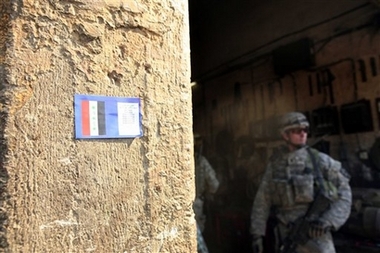US House Democrats unveil anti-war bill
(AP)Updated: 2007-02-13 08:47
WASHINGTON - House Democrats rolled out their resolution opposing President Bush's troop increase in Iraq on Monday, setting up a likely rebuke in a political landscape turned upside-down since Congress' overwhelming 2002 endorsement of force against Saddam Hussein.
Debate was to begin Tuesday, and the House vote will mark its first on the war since Democrats won control in the November elections. While the measure is not binding and would not affect the funding of the war, passage would be an embarrassing rejection of Bush's Iraq war policy and could force many Republicans to choose between backing the president or criticizing a deeply unpopular war.
"What the American people want to know is: Does their member of Congress support the president's proposed escalation or do they not?" said House Majority Leader Steny Hoyer.
Hoyer, D-Md., told reporters he had heard from about 20 Republicans who said they opposed the troop buildup, and from one Democrat reluctant to support the resolution. The measure's simple language - it totaled just a few dozen words - was crafted to maximize the number of Republicans who would support it and to emphasize support for the troops.
While Democrats predicted the measure would pass easily, Republican leaders tried to refocus debate on the measure in hopes of putting Democrats on the defensive.
"This resolution is the first step in the Democrats' plan to cut off funding for American troops who are in harm's way, and their leaders have made this abundantly clear," said House Republican leader John Boehner , R-Ohio.
Each of the House's 435 members and five delegates will be allotted five minutes to speak on the issue - stretching the debate until midnight most nights until Friday's vote. Democratic leaders said Monday they planned a weeklong debate that would restrict members to a single vote by week's end, barring any amendments or a GOP alternative.
This week's debate will be in sharp contrast to the one in 2002, which authorized Bush to use force if Iraqi President Saddam Hussein did not comply with U.N. weapons inspectors.
That debate resulted in solid margins of support from Republicans and Democrats - a victory for a president buoyed by popular ratings following the Sept. 11 attacks and easily assuring a jittery nation that Hussein posed an imminent threat to the United States.
In October 2002, just over half of the public - 52 percent - approved of Bush's handling of Iraq in Gallup polling.
But Bush now faces a new political landscape. After 47 months of war, more than 3,100 U.S. troops have died and the justification for the invasion - Saddam's ties to al-Qaida and development of weapons of mass destruction - has been discredited. And last November, voters unseated enough Republicans with anti-war candidates to hand the reins to Democrats, who are united against the war if not what to do about it.
Public approval of Bush's handling of Iraq is now at 32 percent, the lowest
in AP-Ipsos polling. And the latest intelligence estimate on Iraq found that
Iraqi leaders will be hard pressed to craft a lasting political settlement - a
key component of Bush's strategy - in the next year and a half.
| 1 | 2 |  |
|
||
|
||
|
|

